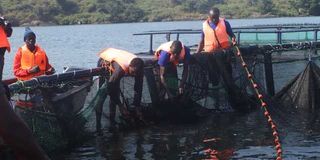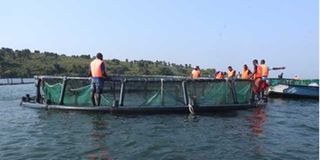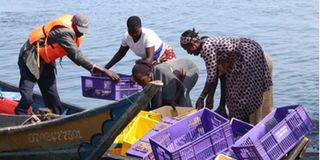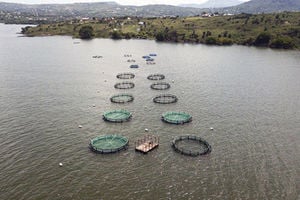
Workers at Rio Fish Farm harvest fish from a cage at Rasira Beach in Suba South.
Lake Victoria, the world’s largest tropical lake, is grappling with ecological challenges that threaten its marine life and the livelihoods of communities dependent on it.
Over the years, the lake has experienced drastic environmental changes.
In some areas, its waters have turned green and emit a foul odor—a result of pollution from chemical and plastic waste from industries and farms, rogue fishing methods, and a rising demand for fish fueled by population growth.
These issues have led to a significant drop in fish production, alarming ecologists and communities.
In Homa Bay, the largest fish-producing region in Nyanza, annual fish production has plummeted from 100,000 metric tonnes a decade ago to just 39,000 metric tonnes today.
County Fisheries Services Director George Okoth warns that the situation will worsen if immediate conservation efforts are not undertaken.
“Our county heavily relies on fish supply as an economic activity. It is therefore important to protect the resource,” Mr Okoth said.
Despite the grim outlook, there is hope. Cage fishing, an innovative aquaculture method, is gaining traction as a potential solution.
This system involves raising fish in net cages submerged in water, allowing natural flow while providing controlled feeding until the fish mature for harvesting.
Although cage fishing faces challenges such as adverse weather, vandalism, and pollution, it is viewed as a sustainable approach to revitalise Lake Victoria’s fishing industry.

Fish cages at Rasira Beach in Suba South.
Furthermore, women in the region are leading this transformative change, carving a path for sustainable fishing practices and economic empowerment.
Fishing in Lake Victoria has traditionally been male-dominated. However, women in areas like Rusinga Island are breaking barriers.
Members of the Rusinga Nile Perch Women Group have ventured into cage fishing to address declining fish supplies and reduce reliance on male-dominated fishing practices.
Group chairperson Benta Adhiambo recalls the struggle women faced, often scrambling for limited fish supplies when boats docked. Some women were even coerced into “sex for fish” arrangements to access the resource.
“We got empowered after different groups engaged us on the dangers of depending on men. Most women who listened to the talks decided to become independent,” she said.
Founded in 2021 with ten women, the group has grown to 21 members, including four men.
They initially pooled resources to purchase a boat, which they hired out to fishermen and used to supply fish to the market.
Their success attracted support from Farm Africa, an organisation promoting sustainable agriculture and aquaculture.
Providing training for fish farmers and helping them access high-value markets to increase their incomes. It also supports the suppliers of feed and fingerlings (young fish) to improve the quality of their produce and help them sell to farmers.
Farmed fish
Farm Africa help traders to increase their access to markets and capacity to sell larger volumes of farmed fish.
Farm Africa helped the group establish a fish cage at Nyagina Beach, stocking it with over 35,000 fingerlings. Although some mortalities occurred, the group replaced them and is on track to harvest their first stock after eight months.
“The fish feed less in cool weather, so we were trained to monitor their behaviour and adjust feeding schedules. Records are kept meticulously to minimise waste,” Ms Adhiambo said.

Women load fish from a boat onto plastic crates at Rasira Beach in Suba South before taking the delicacy to the market.
Cleaning the cages regularly and ensuring good water quality have also contributed to the health of their fish. Farm Africa’s support extends beyond providing equipment and training.
The organisation introduced a revolving fund to help women establish cages and supplied them with feed and a freezer for fish storage.
“We are conducting capacity building for the women to encourage growth and resilience in their businesses,” said Farm Africa Country Director Mary Nayle.
The women are also exploring soybean farming to produce their fish feed, cutting costs while diversifying their income streams.
“We currently have plans to engage in soybean production,” said group secretary Cynthia Onyango.
The project has helped address long-standing issues such as the “sex for fish” vice. Sex for fish, sometimes referred to as “fish for sex”, is a phenomenon in which female fish traders engage in transactional sexual relationships with fishermen to secure their supply of fish, often out of coercion. It used to be rampant more than ten years ago.
By becoming producers, women no longer rely on male fishermen for supplies. “This has completely eradicated the practice at our beach,” said Ms Adhiambo.
The success of initiatives like the Rusinga Nile Perch Women Group offers a blueprint for sustainable aquaculture in Lake Victoria.
Local fishermen, such as Nyagina Beach Management Chairman Joseph Ouma, support these efforts, acknowledging the need for change.
“Reduced fish stocks made previous programs unsustainable, but cage fishing offers hope,” he said.









